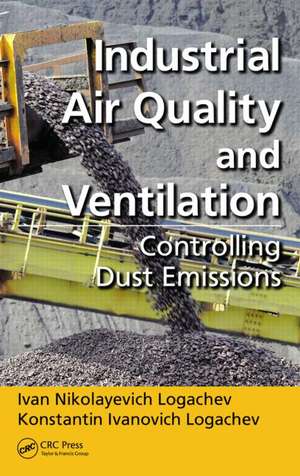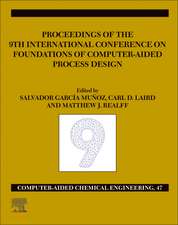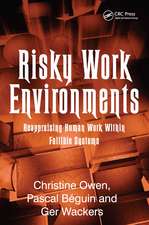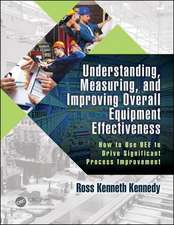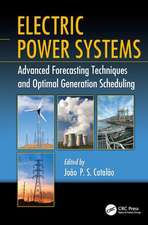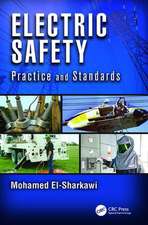Industrial Air Quality and Ventilation: Controlling Dust Emissions
Autor Ivan Nikolayevich Logachev, Konstantin Ivanovich Logacheven Limba Engleză Hardback – 20 feb 2014
Summarizing the results of the authors’ research conducted over the past 40 years, Industrial Air Quality and Ventilation: Controlling Dust Emissions examines air injection in granular material streams and defines the closed hood capacity widely used in the mechanical reprocessing of minerals. This book introduces a methodological approach (dynamic theory) that broadens the range of granular materials, including inter-heated material. It considers the mechanisms of ejecting air in different variations from uniform air motion processes in closed chutes to the forming of accelerated air streams in a free particles flow. It also provides the scientific basics of calculation for local exhaust ventilation dust production (aspiration), and enables readers to accurately apply these results to the mechanical processing of various materials.
• Describes the engineering methods for calculating the amounts of aspirated air for various industries and technological units
• Assists in developing new environmentally clean and competitive advanced technologies and equipment for the processing of granular materials
• Proposes new technical solutions that are more sanitary and require less energy and water consumption
• Looks at specific industry examples of localization of release
Industrial Air Quality and Ventilation: Controlling Dust Emissions proposes low power consumption-based technical solutions and outlines more accurate methods of calculating recommended performance. Richly illustrated with practical suggestions and techniques, the text includes real-world applications in the field of aerodynamic processes within gravitational fluxes of granular material, and encourages the development of new environmentally clean and competitive advanced technologies and equipment for the processing of granular materials.
| Toate formatele și edițiile | Preț | Express |
|---|---|---|
| Paperback (1) | 705.50 lei 43-57 zile | |
| CRC Press – 29 mar 2017 | 705.50 lei 43-57 zile | |
| Hardback (1) | 1935.49 lei 43-57 zile | |
| CRC Press – 20 feb 2014 | 1935.49 lei 43-57 zile |
Preț: 1935.49 lei
Preț vechi: 2360.35 lei
-18% Nou
Puncte Express: 2903
Preț estimativ în valută:
370.41€ • 385.28$ • 305.79£
370.41€ • 385.28$ • 305.79£
Carte tipărită la comandă
Livrare economică 14-28 aprilie
Preluare comenzi: 021 569.72.76
Specificații
ISBN-13: 9781482222166
ISBN-10: 1482222167
Pagini: 418
Ilustrații: 159 black & white illustrations, 57 black & white tables
Dimensiuni: 156 x 234 x 28 mm
Greutate: 0.73 kg
Ediția:New.
Editura: CRC Press
Colecția CRC Press
ISBN-10: 1482222167
Pagini: 418
Ilustrații: 159 black & white illustrations, 57 black & white tables
Dimensiuni: 156 x 234 x 28 mm
Greutate: 0.73 kg
Ediția:New.
Editura: CRC Press
Colecția CRC Press
Public țintă
Professional Practice & DevelopmentCuprins
Dust and Air Mechanics of Bulk Material Transfer. Aerodynamic Properties of Particles in the Gravitational Flow of a Chuted Bulk Material. Air Injection in Chutes. The Aerodynamics of Solid-Particle Jets. Engineering Solutions for Dust Release Containment and Air Dedusting. Conclusion. Appendices. References. Index.
Notă biografică
Ivan Nikolayevich Logachev graduated from the Kharkov Engineering Building Institute in 1962. The author of over 300 scientific papers, and more than 50 inventions and monographs, he is currently a professor at Belgorod State Technological University, Russia.
Konstantin Ivanovich Logachev graduated from the Dnepropetrovsk State University in 1992. Since 1995 he has worked at the Belgorod State Technological University. He is the author of over 150 scientific publications.
Konstantin Ivanovich Logachev graduated from the Dnepropetrovsk State University in 1992. Since 1995 he has worked at the Belgorod State Technological University. He is the author of over 150 scientific publications.
Recenzii
"This book summarises the results of the authors research conducted over the past 40 years. …The conclusion reminds readers that the authors original research was aimed at improving the theoretical basis for design of ventilated suction hoods used for bulk material transfer groups and then to present their basic findings and resulting conclusions."
—ROSPA
"The book addresses the very complex topic of dust generation and fugitive emissions in industry. It provides detailed analyses, theories and data of numerous application areas — with the aim of improving the design and operation of efficient dust control systems. I have not seen such a detailed study of this complex area before, and I am confident that the book will generate a great deal of interest in both the scientific and industry communities."
—Peter Wypych, Professor, University of Wollongong
"A solid academic treatise on the evolution of dust and particulates from conveying system transfer points, with a good amount of useful data to go with the theoretical equations."
—Eric Anderson, Consulting Engineer
—ROSPA
"The book addresses the very complex topic of dust generation and fugitive emissions in industry. It provides detailed analyses, theories and data of numerous application areas — with the aim of improving the design and operation of efficient dust control systems. I have not seen such a detailed study of this complex area before, and I am confident that the book will generate a great deal of interest in both the scientific and industry communities."
—Peter Wypych, Professor, University of Wollongong
"A solid academic treatise on the evolution of dust and particulates from conveying system transfer points, with a good amount of useful data to go with the theoretical equations."
—Eric Anderson, Consulting Engineer
Descriere
This book presents both theoretical and practical guidance for the design and implementation of local exhaust and ventilation systems in industrial facilities. It explains the mechanism and processes of ejecting airflows in different variations—from uniform air motion processes in closed chutes to the creation of accelerated air streams in a free-particle flow. It also examines the engineering methods of calculating the amount of aspirated air for various industries, and compares the calculated volumes of aspiration with real-life test results.
